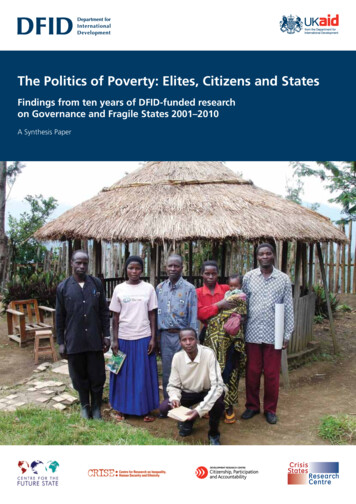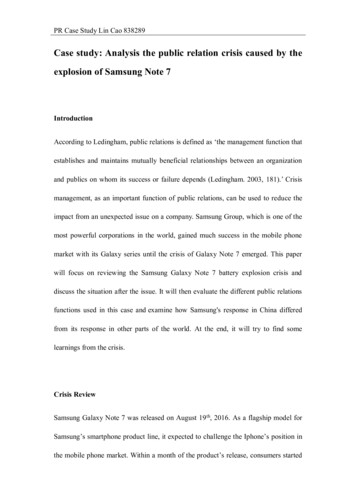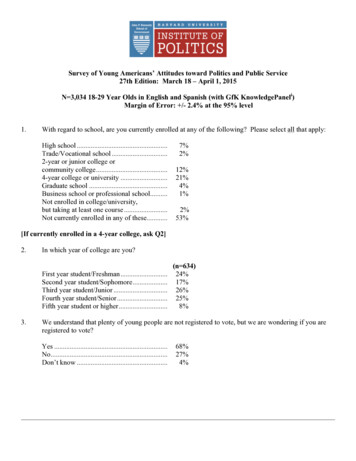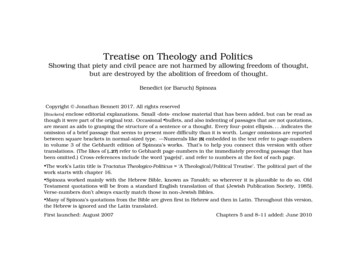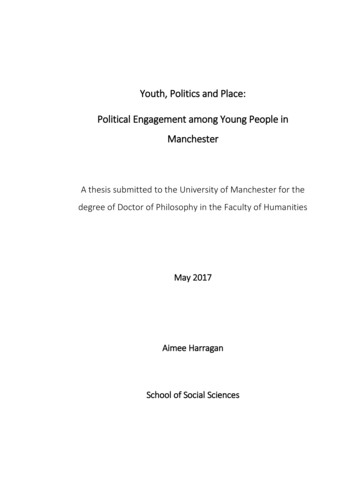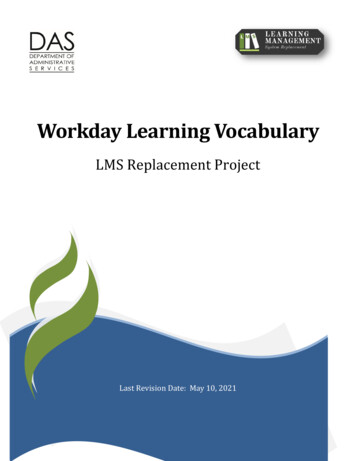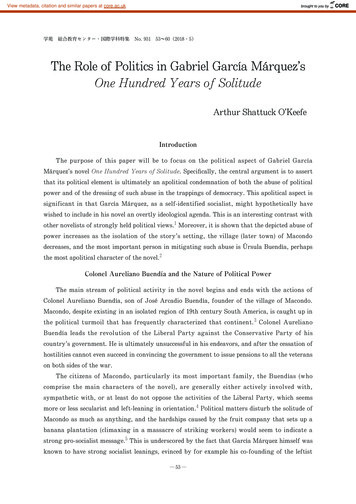
Transcription
View metadata, citation and similar papers at ��科特集brought to you byNo. 93153〜60(2018・5)The Role of Politics in Gabriel García Márquez’sOne Hundred Years of SolitudeArthur Shattuck O’KeefeIntroductionThe purpose of this paper will be to focus on the political aspect of Gabriel GarcíaMárquez’s novel One Hundred Years of Solitude. Specifically, the central argument is to assertthat its political element is ultimately an apolitical condemnation of both the abuse of politicalpower and of the dressing of such abuse in the trappings of democracy. This apolitical aspect issignificant in that García Márquez, as a self-identified socialist, might hypothetically havewished to include in his novel an overtly ideological agenda. This is an interesting contrast withother novelists of strongly held political views.1 Moreover, it is shown that the depicted abuse ofpower increases as the isolation of the story’s setting, the village (later town) of Macondodecreases, and the most important person in mitigating such abuse is Úrsula Buendía, perhapsthe most apolitical character of the novel.2Colonel Aureliano Buendía and the Nature of Political PowerThe main stream of political activity in the novel begins and ends with the actions ofColonel Aureliano Buendía, son of José Arcadio Buendía, founder of the village of Macondo.Macondo, despite existing in an isolated region of 19th century South America, is caught up inthe political turmoil that has frequently characterized that continent. 3 Colonel AurelianoBuendía leads the revolution of the Liberal Party against the Conservative Party of hiscountry’s government. He is ultimately unsuccessful in his endeavors, and after the cessation ofhostilities cannot even succeed in convincing the government to issue pensions to all the veteranson both sides of the war.The citizens of Macondo, particularly its most important family, the Buendías (whocomprise the main characters of the novel), are generally either actively involved with,sympathetic with, or at least do not oppose the activities of the Liberal Party, which seemsmore or less secularist and left-leaning in orientation.4 Political matters disturb the solitude ofMacondo as much as anything, and the hardships caused by the fruit company that sets up abanana plantation (climaxing in a massacre of striking workers) would seem to indicate astrong pro-socialist message.5 This is underscored by the fact that García Márquez himself wasknown to have strong socialist leanings, evinced by for example his co-founding of the leftist 53 CORE
magazine Alternativa in 1974 and his well-known friendship with Cuban socialist dictator FidelCastro.6Such convictions, one may speculate, might well tempt a writer to compose a political tractin the guise of a novel.7 Yet instead, García Márquez illustrates elements of the nature of powerrelationships generally, rather than the promotion or repudiation of political ideologies in andof themselves; this is the primary element of how political power is depicted. The abuse of powerand its negative effects on the people of Macondo increase as Macondo’s isolation from theoutside world is reduced. Márquez shows the reader the potentially malignant nature of largescale authority per se, with both“left-wing”and“right-wing”individuals and organizationscomprising a depictive framework. In connection with this, Gene H. Bell-Villada makes asignificant observation regarding One Hundred Years of Solitude:[The novel’s] appeal is to all ideologies: leftists like its dealing with social struggles and its portrait ofimperialism; conservatives are heartened by the corruption and/or failure of those struggles and withthe sustaining role of the family; nihilists and quietists find their pessimism reconfirmed; andapolitical hedonists find solace in all the sex and swashbuckling. (93)To expand upon Bell-Villada’s insight: the novel ideologically having“something foreveryone”ultimately means“nothing for anyone”in terms of truly having one’s ideologicalstance confirmed. This makes One Hundred Years of Solitude much more sophisticated andnuanced than it might otherwise have been.Whatever ideological fervor Aureliano may have possessed at the start of his militaryadventures, he grows cynical and pessimistic as time goes on, as evinced by this exchange withhis comrade Colonel Gerineldo Márquez:“Tell me something, old friend: why are you fighting?”“What other reason could there be?”Colonel Gerineldo Márquez answered. “For the great Liberalparty.”“You’re lucky because you know why,”he answered.“As far as I’m concerned, I’ve come torealize only just now that I’m fighting because of pride.”“That’s bad,”Colonel Gerineldo Márquez said.Colonel Aureliano Buendía was amused at his alarm.“Naturally,”he said. “But in any case, it’sbetter than not knowing why you’re fighting.”He looked him in the eyes and added with a smile:“Or fighting, like you, for something that doesn’t have any meaning for anyone.”(139)This does not necessarily mean that Aureliano has become a political nihilist. Rather hesees that whatever potential good there is in human society, this good cannot be achieved byeither the Liberal or Conservative parties, even if Aureliano’s sympathies are with Liberalideology. The most telling display of this loss of faith is when Aureliano, in his capacity ascommander of the Liberal forces, comes to an accommodation with the enemy through six 54
Liberal Party lawyers who have come to Macondo. The terms they propose result in a LiberalParty platform that is little different from the Conservative Party’s:They asked first that he renounce the revision of property titles in order to get back the support ofthe Liberal landowners. They asked, secondly, that he renounce the fight against clerical influence inorder to obtain the support of the Catholic masses. They asked, finally, that he renounce the aim ofequal rights for natural and illegitimate children in order to preserve the integrity of the home.“That means,”Colonel Aureliano Buendía said, smiling when the reading was over, “that allwe’re fighting for is power.” Still smiling, he took the documents the delegates gave him and made ready to sign them.“Since that’s the way it is,”he concluded,“we have no objection to accepting.”(172-173)Aureliano, seeing the farcical parody of social reform that the Liberal Party has become,signals his contempt for it by not mincing words with the lawyers, even as he gives up on anychance for a truly beneficent revolution and accedes to their requests. He has come to seepolitical power as ultimately an end in itself. Later, as he leads his troops to suppress resistanceto the armistice among the Liberal forces, his motivation is far removed from politics, or ratheris anti-political:He was never a greater soldier than at that time. The certainty that he was finally fighting forhis own liberation and not for abstract ideals, for slogans that politicians could twist left and rightaccording to the circumstances, filled him with an ardent enthusiasm. (174-175)Aureliano’s disillusionment, then, makes him eager to completely detach himself from thepolitical arena, to become in effect an apolitical figure. The corollary to this is that power per seand its abuse, rather than any“ism,”are what primarily infringe on the solitude of Macondo.The Abuse of Power across the Political SpectrumThe political goals of the Liberal Party are described in scathing terms by the governmentappointed magistrate of Macondo, Don Apolinar Moscote, to the young Aureliano Buendía (wholater leads the rebellion against the landowner-supported Conservative government):The Liberals, he said, were Freemasons, bad people, wanting to hang priests, to institute civilmarriage and divorce, to recognize the rights of illegitimate children as equal to those of legitimateones, and to cut the country up into a federal system that would take power away from the supremeauthority. The Conservatives, on the other hand, who had received their power directly from God,proposed the establishment of public order and family morality. They were the defenders of the faithof Christ, of the principle of authority (98)As the book was written in an age when civil marriage and the rights of“illegitimate”children had come to be taken for granted in much of the world, this passage can easily be seen 55
as a criticism of the ideology Moscote promotes. García Márquez seeks to damn the devil withhis own words, as the magistrate’s speech will seem to many modern readers ludicrous andhypocritically immoral. Moscote’s stuffing of the ballot boxes as he supervises an election inMacondo (99) completes the picture of a corrupt regime that only pays lip service to democracy.Yet the depiction of Liberal Party characters is far from pristine. When Aureliano, angryat the injustice of the Conservatives’ election-tampering, speaks with Dr. Noguera, a secretfederalist agitator hiding out in Macondo, he is horrified at the latter’s intention to initiatemass assassinations of not only all Conservative officials but of their entire families as well,including Moscote, his wife, and six daughters:“You’re no Liberal or anything else,”Aureliano told him without getting excited. “You’re nothingbut a butcher.”(102)When Colonel Aureliano Buendía takes on the mantle of revolutionary leader, he does sowith scruples, guaranteeing the safety of Moscote and his family (not least because of hismarriage to Moscote’s daughter Remedios). But while Aureliano is off to war his nephewArcadio assumes authority over Macondo and in the name of the Liberal Party becomes amurderous tinpot dictator. Exercising power arbitrarily to compensate for feelings ofinadequacy, he prohibits religious services, orders the execution of a man who mocks him, andimprisons those who protest his actions (107-108). As his megalomania increases, only theintervention of Aureliano’s mother Úrsula, matriarch of the village, saves Macondo from moreof Arcadio’s ravages.While Úrsula is the most vocal opponent of such corruption, the character who tries toprevent this process from the beginning is her husband, José Arcadio Buendía, founder andpatriarch of Macondo and father of Colonel Aureliano Buendía. When Don Apolinar Moscotefirst arrives and declares himself to be Macondo’s government-appointed magistrate, his firstofficial act is to order all residents to paint their houses blue in celebration of the country’sIndependence Day. José Arcadio Buendía calmly confronts the magistrate:Facing Don Apolinar Moscote, still without raising his voice, he gave a detailed account of howthey had founded the village, of how they had distributed the land, opened the roads, and introducedthe improvements that necessity required without having bothered the government and withoutanyone having bothered them.“We are so peaceful that none of us has died even of a natural death,”he said.“You can see that we still don’t have any cemetery.”No one was upset that the governmenthad not helped them. On the contrary, they were happy that up until then it had let them grow inpeace, and he hoped that it would continue leaving them that way, because they had not founded atown so that the first upstart who came along would tell them what to do (57-58)A significant element of this statement is that while it extols the virtues of what essentiallybegins as an idyllic, socialist utopia, the society in question Macondo exists on an 56
exceedingly small, localized scale. Once Macondo becomes embroiled in national politics (i.e.“left” versus“right”), events such as the petty and murderous tyranny of Aureliano’s nephewArcadio and the massacre of the striking workers eventually arise. José Arcadio Buendía’sassertion that Macondo does not and has never needed anything from the government stands insharp contrast to the common perception of socialism as entailing a slavish dependence ongovernment handouts.José Arcadio Buendía grudgingly tolerates Don Apolinar Moscote’s presence, but thelatter’s authority is tentative and conditional upon the alliances he builds with the Buendíafamily. This initial confrontation between the two men is a crucial point in the novel, as it is thebeginning of Macondo’s gradual loss of isolation and its corresponding difficulties: thebeginning of the end of Macondo’s utopian peace, an end characterized by political conflict inwhich there are ultimately no ideologically-based“good guys and bad guys.”Úrsula Buendía’s Apolitical ActivismAureliano’s mother Úrsula, who exhibits little interest in anything political, simply wishesto have a quiet family life. A devoutly religious woman, she expresses no views remotelyresembling the Conservative insistence on a God-given right to rule the country or the denial oflegal rights to children born out of wedlock. Nor does she take any explicitly pro-Liberal Partystance, despite her son’s position as leader of the revolution. However, through a deep sense ofmoral conviction and sheer force of will, she uncompromisingly intervenes upon seeing extremeabuses of power.Only when Úrsula severely whips her grandson Arcadio as he is about to have Moscoteexecuted (for having criticized Arcadio’s despotism) do things in Macondo go back to normal,with Úrsula in charge. It is thus Úrsula, an apolitical force, who ends the tyrannical holdArcadio has had over the village. Similarly, Úrsula plays a significant role in Colonel AurelianoBuendía’s decision to rescind his order to execute fellow revolutionary Gerineldo Márquez forhigh treason (which in this case meant protesting Aureliano’s coming to an accommodationwith the Conservative regime) (173). She also fruitlessly goes to great lengths to preventAureliano’s execution of Conservative military commander General José Raquel Moncada (whohad spent a period in control of Macondo), pleading that he was a good man who had givenMacondo the best government it had ever had (162).It is significant that all three of the above interventions are to prevent executions, theplanned and calculated destruction of human life for specifically political rationales. In theabsence of such situations, Úrsula focuses her attention on household duties and on caring forher family. Úrsula, then, represents a benevolent, apolitical power that lies dormant except inextreme situations. She is in this sense the conscience of the Buendía family and of Macondo,personifying an unimpeachable sense of right and wrong that both eschews and transcendspolitical considerations. 57
ConclusionIn One Hundred Years of Solitude, no political ideology is depicted as ubiquitously keepingthe moral high ground to the exclusion of all other factors. If such were the case, the efforts ofone side or the other would be relatively benevolent and utopian in nature rather than themixture of idealism and corruption seen in the novel. The warm personal relationship betweenColonel Aureliano Buendía and Don Apolinar Moscote, and the connection of the two menthrough marriage further defy the separation of good and evil in such simplistic and starkterms.Positive aspects of both socialism and capitalism are depicted in the story, but on a small,localized scale. In the early days of Macondo, José Arcadio Buendía, Úrsula’s husband andpatriarch of the village,“set up the placement of the houses in such a way that from all of themone could reach the river and draw water with the same effort, and he had lined up the streetswith such good sense that no house got more sun than another during the hot time of day Itwas a truly happy village ”(9). This depiction of benign local collectivism is in contrast toÚrsula’s lucrative private business of candy animals, bread, and pastries undertaken afterMacondo has grown into a busy town (55). It is a decidedly capitalist enterprise, albeit on asmall scale. Rather than either condemnation or praise of socialism or capitalism per se, we cansee that each way of life becomes less benevolent or less tenable as more arbitrary powerbecomes involved. This trend increases as Macondo becomes less and less isolated. There is anabsence of any clear-cut delineation between“good” and“bad”systems depicted in certaindystopian tales such as Jack London’s The Iron Heel (socialist) and Ayn Rand’s Atlas Shrugged(capitalist).This is partly reflected in García Márquez’s stated views on the language of politics in aNew York Times Book Review interview conducted in 1988:I really detest political-speak. Words like“the people,”for example, have lost their meaning. Wehave to fight against fossilized language. Not only in the case of the Marxists, who have petrified thelanguage most, but the liberals too.“Democracy”is another such word. The Soviets say they’redemocratic; the Americans say they’re democratic; El Salvador does, and Mexico too. Everyone whocan organize an election says he’s democratic.“Independence”is another one. These are words thathave come to mean very little. They’re disconnected; they don’t describe the reality they represent.García Márquez’s point that anyone can claim the title“democratic”calls to mind the ballotbox-stuffing of Don Apolinar Moscote and the tyrannical behavior of Úrsula’s grandsonArcadio, both done ostensibly in the name of democracy. Such a view is perhaps most directlyreflected in Aureliano’s above-mentioned certainty, as he strives to end the civil war, that he is“finally fighting for his own liberation and not for abstract ideals, for slogans that politicianscould twist left and right according to the circumstances”(174-175). 58
The depiction of political action in One Hundred Years of Solitude is but one thread in a richliterary tapestry of the human experience. As for this element of the novel, even the mostisolated community in a modernizing world must eventually deal with national politics, and thispolitical dimension is a key aspect of Macondo’s gradual emergence from the solitude of thetitle. Neither benevolence nor cruelty are depicted as the unique province of any single ideologyor ideologue; this element, rather than acting as a vehicle for political advocacy, depicts politicalaction to illustrate the nature of power relationships and the abuse of power.Notes1 To be clear, there is no assertion made herein that One Hundred Years of Solitude is commonly viewedas a pro-socialist novel. Rather, its subject matter could easily have been used for such a purpose, yetMárquez chose not to. As comparisons, one might consider examples from dystopian fiction: JackLondon’s The Iron Heel (1908) carries an explicitly pro-socialist message, while Ayn Rand’s AtlasShrugged (1957) serves to convey the author’s anti-collectivist / pro-capitalist views. The most iconic ofdystopian novels, George Orwell’s 1984 (1949), is more nuanced in that while Orwell was sympathetic tosocialism and served with anti-fascist military forces in the Spanish Civil War (1936-1939), the hyperoppressive totalitarian government of 1984 is an ostensibly socialist body; inferably Orwell wishes notto debunk socialism per se, but to warn the reader of what he believes socialism can morph into. AsO’Brien, the novel’s villain, freely admits to protagonist Winston Smith,“The Party seeks powerentirely for its own sake The German Nazis and the Russian Communists came very close to us intheir methods, but they never had the courage to recognize their own motives Power is not a means; itis an end”(200). One Hundred Years of Solitude, while vastly different from 1984 in most respects (andcertainly not a political dystopian work), is similar in that its depiction of the abuse of power and thebetrayal of ideals is not asserted as the distinctive province of a particular system or ideology.2 One of the characters who might be considered more disinterested in politics than Úrsula is her greatgranddaughter Remedios the Beauty, who lives as the proverbial child of nature and eventuallydisappears into the heavens during a miraculous levitation, one of a number of supernatural occurencesin the novel (242-243).3 While the novel’s setting is clearly South America, the name of the country in which the village ofMacondo exists is never mentioned. It seems safe to assume, however, that One Hundred Years ofSolitude takes place in Colombia, García Márquez’s country of birth. This is evinced by certainhistorical parallels with events such as the violent conflict between the Liberal and Conservative parties(in particular that of their real-life counterparts in the Thousand Days’ War of 1899-1902) and thekilling by soldiers of striking banana plantation workers (309-319), apparently based upon a similarincident in Ciénaga, Colombia in 1928 (see note number 5). As for Macondo, it is commonly believed tohave been based on García Márquez’s home town of Aractaca, Colombia (which in 2006 had a failedreferendum on changing its name to Macondo). However, Santiago Villaveces-Izquierdo asserts thatMacondo is“a powerful metaphor for what has become of Colombia today” (7). Villaveces-Izquierdocites from the novel a mysterious amnesia that temporarily afflicts the entire village (Chapter 3) as aparallel to the real-life state of Colombia which“opts to forget”actions such as the forced displacementand marginalization of indigenous peoples and other minorities (7).4 It could be postulated that the lack of any specific ideological terms in One Hundred Years of Solitude(other than the rather wide-ranging categories of“liberal”and“conservative”) support the view that 59
while political conflict plays a major role in the novel, the effects of ideological fervor (rather than theideologies themselves) form the major political element of the story.5 Eduardo Posada-Carbó has argued that the apparent real-life inspiration for the banana plantationmassacre (309-319), a strike against the United Fruit Company in 1928 in Ciénaga, Colombia that endedwith government troops firing on protesters, actually resulted in no more than five deaths (as opposedto the 3,000 dead in the novel). García Márquez, Posada-Carbó asserts, never claimed that the numberkilled in the novel reflected historical accuracy (395-396).6 García’s relationship to Castro is explored in detail by authors Ángel Esteban and Stéphanie Panichelliin their 2009 book Fidel & Gabo. They strongly criticize Márquez’s failure to publicly criticize Castro’simprisonment and execution of scores of Cuban dissidents in 2003.7 This is not to imply that there was actually any such temptation on García Márquez’s part; there is noevidence of such known to this writer.Works CitedBell-Villada, Gene H. García Márquez: The Man and His Work. Chapel Hill: University of North CarolinaPress, 1990.Esteban, Ángel and Stéphanie Panichelli. Fidel & Gabo: A Portrait of the Legendary Friendship BetweenFidel Castro and Gabriel García Márquez. Trans. Diane Stockwell. New York: Pegasus Books, 2009.London, Jack. The Iron Heel. Chicago: Lawrence Hill Books, 1908.Márquez, Gabriel García.“Gabriel Marquez on Love, Plagues, and Politics.”Interview by Marlise Simons.New York Times Book Review 21 Feb. 1988. 13 January anted print . One Hundred Years of Solitude. (Cien Años de Soledad) 1967. Trans. Gregory Rabassa. London:Picador, Penguin Books, 2014.“Marquez Town Rebuffs Macondo Name.” BBC News, 26 June 2006. 15 Sep. 2011. ell, George. 1984 . 1949. New York: New American Library of World Literature, 1954.Posada-Carbó, Eduardo.“Fiction as History: The Bananeras and Gabriel García Márquez’s One HundredYears of Solitude.”Journal of Latin American Studies, Vol. 30, No. 2, May 1998. 395-414. y.edu/files/2014/06/158531 146 96 128 36 25 082014 03 06.pdfRand, Ayn. Atlas Shrugged. 1957. New York: Signet, 1996.Villaveces-Izquierdo, Santiago.“Internal Diaspora and State Imagination: Colombia’s Failure to Envisiona Nation.” Seminar on Social Categories ìn Population Health. Committee on AnthropologicalDemography of the International Union for the Scientific Study of Population, 15-18 Sep. 1999, Cairo,Egypt. 15 Sep. 2011. ations/Cairo99/cairo-27.pdf (アーサー 60 シャタックオキーフ国際学科)
One Hundred Years of Solitude Arthur Shattuck O’Keefe Introduction The purpose of this paper will be to focus on the political aspect of Gabriel García Márquez’s novel One Hundred Years of Solitude

